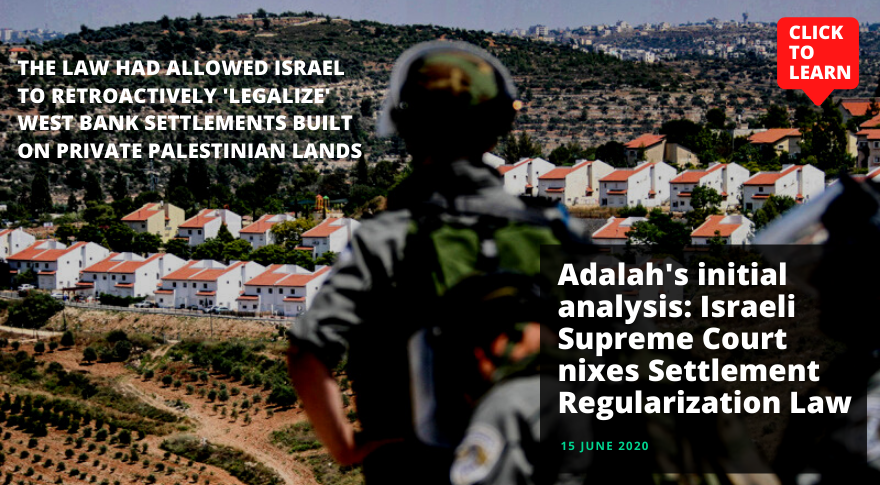Initial analysis of the Israeli Supreme Court's decision in the Settlements Regularization Law Case, 15 June 2020
On 9 June 2020, the Israeli Supreme Court decided in an 8 to 1 judgment to cancel the "Settlements Regularization Law for Judea and Samaria [the West Bank]".[1] In a ruling spanning 107 pages, the court found that the law violates the rights of Palestinians to property, equality and dignity disproportionately.[2]
CLICK THIS PHOTO for Adalah’s analysis in PDF format:
The Knesset passed the controversial law in February 2017. The law provides that the State of Israel could expropriate privately-owned Palestinian land in the occupied West Bank, and to retroactively “regularize” or “legalize” the Israeli settlements built on it. An Addendum to the Law identified 16 settlements to which the law would apply (see Annex at the end of this paper, which also includes a list of the Palestinian villages on which these settlements encroach). According to the court's decision, as of 2016, the scope of Israeli construction on privately-owned Palestinian land in the West Bank amounted to 3,455 structures, of which 1,285 are residential buildings or public institutions.[3]
The Court’s decision is based on several main legal principles:
- International law and the non-sovereignty principle applies to the West Bank: The decision stresses that since June 1967, the laws that apply in the West Bank are the laws of "belligerent occupation," supplemented by international human rights law. Further, “the practical implication is that the law of the State of Israel does not apply in the region.”[4]
As such, the military commander in the West Bank is not the sovereign and his authority in the area is temporary by its nature:
- “In spite of his control over an area under belligerent occupation, the military commander is not the sovereign there and the accepted approach is that the concept of possession in the territory does not […] also transfer the sovereignty in the territory held from the previous sovereign to the military commander” and “as a result, the military commander's authority is inherently temporary in the sense that it has been withdrawn for the duration of the effective holding of the territory by the military government.”[5]
- Difficulties in the Knesset's enactment of laws concerning the Palestinians in the West Bank: The court ruled that the “law contradicts the principle of territorial sovereignty and is exceptional in the landscape of Israeli legislation since the Knesset has enacted primary legislation that will apply to Palestinians in the area and to land located in the area.”[6] The court further elaborated that:
“Given the Israeli successive government's approach for decades that the military commander has legislative powers in the area, there is great difficulty in changing the basic norm practiced regarding the identity of the authorized legislator in the area indirectly and in the way of establishing individual arrangements.” [Further] “under these circumstances, the issue of the Knesset's authority to enact laws that are directly applicable in the region, as well as the question of the Knesset's imposition of such legislation on the rules of international law applicable in belligerent occupation, raise considerable difficulties.”[7]
- The Palestinians are "protected persons" and the settlers have a different status: The court stressed in its decision the Palestinians in the West Bank are "protected persons" as defined in Article 4 of the Fourth Geneva Convention, and differentiated that status from that of settlers. Based on the difference in status, the court concluded that the applicable legal framework forbids the confiscation of Palestinian land for the purposes of Israeli settlements:
“To the extent that we are dealing with the question of "public need" under the expropriation laws that apply in the region, I do not believe that these permit the expropriation of Palestinian or privately owned land [where] there is a person claiming proprietary affiliation, for the purpose of establishing and expanding Israeli settlements and for this purpose only.”[8]
In this context, the court rejected the government’s argument “that the military commander's duty to ensure the needs of the local population in the area also applies to those hundreds of thousands of Israeli civilians living in the area, and some of whom were even born there.” According to the government, “this population should not be distinguished from the Palestinian population subject to the same land regime.” The court stressed that such position, “ignores the complexities that distinguish the Israeli population in the area from the Palestinian population and that in any case […] the law applicable to the Palestinian population does not help the government's argument in this regard.”[9]
Based on this assertion, the court relied on Article 27 of the Fourth Geneva Convention regarding “protected persons” to uphold the rights of the Palestinians to property, equality and dignity.
Possibility of Future Confiscations
Despite the positive outcome, the court's striking down of the law on the basis of disproportionality, raises concern about the opening of a window for future confiscations of Palestinian land for purposes of settlements. In part of its decision, the court referred to other alternatives that are “less harmful tools” that might be more appropriate under the circumstances, adopting the Attorney General's position on the matter. According to the court's judgment, such alternatives include:
- Activation of Article 5 of the Order Regarding Government Property (Judea and Samaria) (Order Number 59), which provides that "every deal made in good faith between the supervisor and another individual over all property that the supervisor thought was government property at the time of the deal, will not be disqualified and will remain valid even if it is proven that the property was not government property at the time of the deal."[10]
- “The use of the statute of limitations applicable in the area, centered on Article 78 of the Ottoman Land Law of 7 Ramadan 1274 (21.4.1858).” The judgment elaborates that:
“The acceptable interpretation of section 78 - starting with the relationship between the individual and the state - allows a person holding land for ten consecutive years without interruption, to come as a claimant and demand from the state a taboo certificate, that is, transfer of the proprietary rights, if he proves that he fulfilled all the requirements of the section.”[11]
- The court also related to “the statute of limitations applicable in the area is that provided for in section 20 of the Ottoman Land Law, which deals with the assertion of procedural obsolescence in disputes to which the State is not a party.”[12]
- Further, the court referred to, “similar to Israeli law, situations of construction and planting in other lands.”[13]
The court stressed that “these arrangements require individual examination of each case according to its circumstances, giving weight to the special status of the Palestinians in the area, their property rights and the duty of the military commander according to the law of the belligerent occupation to protect this right.”[14]
Implications on the question of annexation
The court's delivery of the decision at this time might have implications on the annexation process expected to take place this summer, as stipulated in the coalition agreement between the Likud and Blue and White parties.[15] The decision also sends a message to the International Criminal Court, which is currently considering whether or not it has territorial jurisdiction to hear the cases concerning the 'Situation in Palestine', that the Israeli judicial system is effective and functional when it comes to the status of the West Bank.
Based on the above-mentioned principles of the judgment, it is expected that the ruling will have implications for annexation planned through Israeli legislation. The majority's assertions concerning the non-sovereignty principle, the difficulties of enacting Israeli laws valid on the Palestinians in the West Bank, the temporary nature of the belligerent occupation and the applied legal framework, should all pose legal barriers to annexation laws proposed in the near future.
Nevertheless, striking down this law does not guarantee consistency in future Supreme Court decisions, should annexation legislation be enacted and challenged before the court. Attempts to bypass the ruling could include for example, the legislation of annexation through a Basic Law or the enactment of an annexation law that includes a limitation on judicial review and/or a limited annexation law of the big settlement blocks only, at this stage.
[1] HCJ 1308/17, Silwad Municipality, et al. v. The Knesset, et. al (petition accepted 9 June 2020) (joined by the court with HCJ 2055/17, The Head of Ein Yabrud Village v. The Knesset). The judgment is available in Hebrew at:
[2] Two petitions were filed against the law. HCJ 1308/07 was filed by Adalah – The Legal Center for Arab Minority Rights in Israel, in cooperation with the Jerusalem Legal Aid Center (JLAC) and Al Mezan Center for Human Rights on behalf of 17 local councils in the West Bank. HCJ 2055/17 was filed by Yesh Din and 12 human rights organizations, 23 council heads of Palestinian villages and four landowners.
[3] See paragraph 16 of Chief Justice Hayut's ruling.
[4] Id. para. 2.
[5] Id. para. 3.
[6] Id. para. 32.
[7] Id.
[8] Id. para. 70.
[9] Id.
[10] Id. para. 90. See Adalah’s Briefing Paper, “Israel’s use of ‘good faith’ to confiscate private Palestinian land in the Occupied West Bank – in bad faith”, December 2019 available at: https://www.adalah.org/en/content/view/9885
[11] Id. para. 91.
[12] Id.
[13] Id. para. 92.
[14] Id. para. 93.
[15] See Adalah Press Release, New Netanyahu-Gantz coalition agreement stipulates illegal annexation of West Bank, 23 April 2020, available at: https://www.adalah.org/en/content/view/9997

















